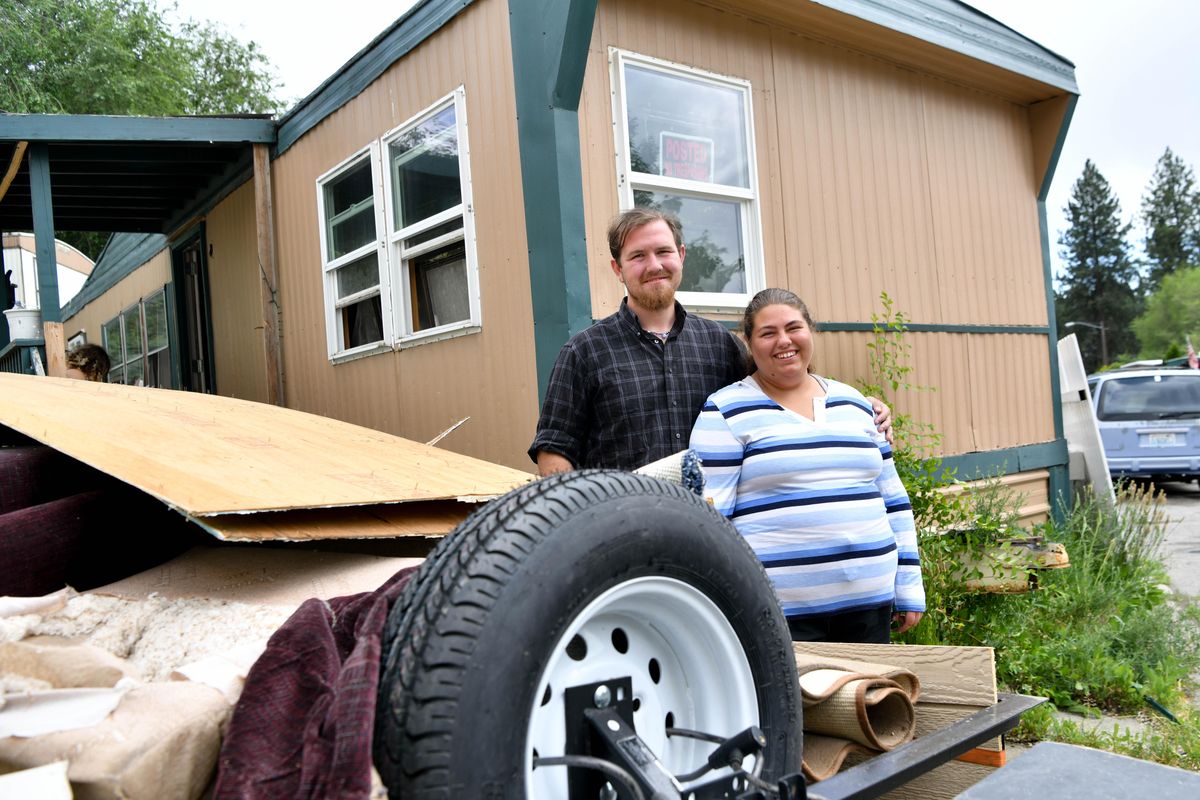Couple living in former homeless camp find a home – and hope

Twenty-year-old Alexes Wilson had just started a new job this spring when the camp she was staying at with her boyfriend was broken up by the city near Latah Creek.
“People came and took our stuff, like it was fair game,” said Wilson this week. Behind her sat the shell of a vacant mobile home in the Spokane Valley the couple hope to buy with her wages. “I have no idea where it’s at.”
“That’s why I can’t wait to get into this place,” said Donaven Farris, 23, resting his hand against the door jamb. “Because it’s four walls, that I can lock.”
The young couple have only been homeless since February, when a string of family and landlord conflicts took them from an apartment in Wenatchee to housing in Deer Park and finally to the overnight shelter for youth at Westminster United Church of Christ in downtown Spokane.
They’re among a growing number of adults ages 18 to 24 who are living without a home in Spokane County, a demographic that is difficult to measure but appears to be on the rise, according to the city.
But Wilson and Farris were determined not to stay that way.
“She was my first referral,” said Sandy Christian, director of training and curriculum development at Freedom Consulting, a nonprofit employment and social services agency, of Wilson. “She’s been like my poster child.”
Wilson said she first sought employment help from SNAP upon arriving in Spokane and was then transferred to Catholic Charities and finally Freedom Consulting.
Freedom Consulting helped match her with a job as a housekeeper at Sunshine Health and Rehab, an assisted living facility on Ninth Avenue, through a Medicaid-sponsored program called Foundational Community Supports. As a housekeeper, Wilson was rising early in the morning at the campground and taking an STA bus with a pass she’d obtained from the city to her job in Spokane Valley.
The camp breakup, what Wilson called “a raid,” jeopardized that progress. The city had posted a 24-hour notice to vacate, she said, but the people the couple were staying with hadn’t notified them that the camp, which was in violation of city laws, would be removed. An ordinance prohibits camping on the city’s public land when shelter beds are available.
“It’s just something that we’d worked for,” Farris said. “She had a special blanket that she’d gotten, when she was younger.”
Instead of focusing on what was lost, Wilson talked with her boss and Christian. They arranged for the couple to stay at a motel, and then found them a private campground while looking for apartments. But in part because of their lack of official rental history, they weren’t able to locate a landlord willing to rent.
That’s when Christian drove into the University Mobile Home Park, on a whim, and asked if there was anything the couple could have. Across from the office was a home that had sat vacant, Christian said, and the couple will now be making monthly payments in addition to a $450 lot fee toward owning the home.
In just a matter of a few weeks, the couple went from having nothing to plotting out their future in the torn-out walls of that neglected unit.
“We weren’t even looking at motor homes,” Wilson said.
“Mobile homes,” Farris corrected. “Motor homes have motors.”
The two met as children, living in the same mobile home park in Wenatchee, they said. They’ve only been romantically involved for a year, but said they’ve been pushing each other through the difficulties of frequent moves and poverty. Neither has a high school degree.
“We’re the quickest people finding something,” Farris said.
“We don’t want to be homeless,” Wilson said.
“We don’t want to be, and that’s because we’re pushing,” Farris continued. “Some days she goes, I want to give up, and I’m like, ‘Nope, you can’t, we can’t, we can’t afford it.’ ”
“You definitely have to have another person pushing you, and the other way around,” Wilson said. “You’ve got to have a rock. I push him, and he pushes me.”
That person can help, even against the stigma that exists in the community against homelessness, Wilson said. The couple frequented the downtown Spokane library when they lived in the shelter and in the camp, and would occasionally run across people who surmised their living situation and looked down on them, including one woman in particular.
“She said, ‘You don’t even use it for what it’s for.’ She was just so rude to us, because we’re homeless, and it’s like, how would you feel if you were coming to what is a public place, and being told basically you’re homeless, you shouldn’t be here?” Farris said. “But it’s a public place, it’s for everyone.”
“I told her to have a nice day when she got on the elevator,” Wilson said. “It made me so embarrassed. It wasn’t my fault, or his fault, that we became homeless.”
The couple know they’re lucky, and that they received a lot of help from volunteers and will continue to receive help from their friends who are living on the street to fix up the small piece of property they hope someday will belong to them.
“Some people are going to be late at times. That’s life. Sometimes you lose a job,” Wilson said. “I’ve been so negative because of what’s happened to us, that I’ve been thinking about maybe, what if I get fired? What’s going to happen to the house? I’ve been thinking about that a lot, and it’s depressing, so I try not to.”